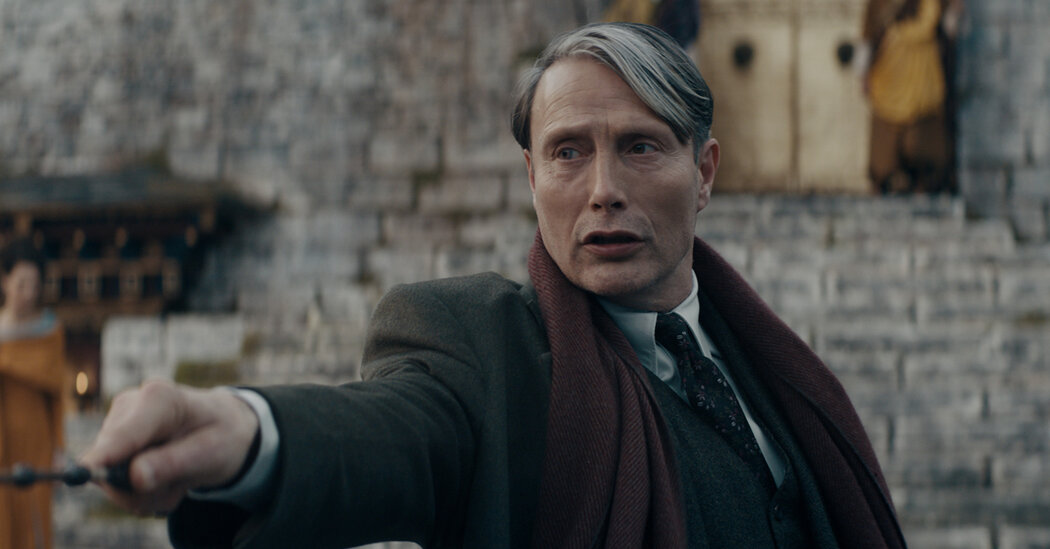
Like so much children’s entertainment these days, “Fantastic Beasts: The Secrets of Dumbledore” is a political primer sprinkled in magic dust. In this third installment in the “Fantastic Beasts” franchise (itself a prequel series to the original “Harry Potter” stories), cuddly critters have mostly been swapped out for darker creatures: Here, scorpionesque freaks guard a prison where activists are tortured (or worse). A chunk of the story is set in 1930s Berlin. The deadly stakes are crystal-ball clear. An alternate subtitle could be “Totalitarianism for Tykes.”
It’s a pointed movie from tip to barbed tail. Instead of building the plot around a tedious pursuit peppered with cutesy digital monsters — a misstep in the first two “Fantastic Beasts” films — the returning director David Yates and the screenwriters, J.K. Rowling and Steve Kloves, center “Secrets of Dumbledore” on an election. Grindelwald, the wizard supremacist last seen attempting to incite a global war, hopes to convince the magical world to back his campaign platform to subjugate nonmagical humans. (The role was last played by Johnny Depp; Mads Mikkelsen takes over the role here, and Grindelwald’s threats sound more probable when delivered with Mikkelsen’s bloodless chill.) Rowling’s readers know to refer to nonmagical people as Muggles. To Grindelwald, they’re “animals,” though he concedes they make a good cup of tea.
The focus is on the tragic entanglements of Albus Dumbledore (Jude Law), who once romanced the hate-inciting Grindelwald and still wears an old blood-oath necklace that strangles him for thinking mean thoughts about his former love. On top of being pained by his bad taste in men, Dumbledore must make amends with his grouchy brother (Richard Coyle) and tormented nephew (Ezra Miller), a murky figure so visibly miserable that flies buzz around his hands.
With Dumbledore grappling with a family full of grievances, the story barely has any room for Newt Scamander (Eddie Redmayne), the fluttery animal caregiver who tends to the fantastic beasts of the title. Redmayne’s character justifies his existence in the plot by coming into possession of a Qilin (pronounced chillin), a rare, fawn-like creature that holds unusual sway in electoral races — it’s a kind of mammalian dowsing rod that has the power to identify a person’s purity of heart and ability to be a leader. The series seems to be shifting its spotlight away from its supposed lead and his love interest from the previous movies, Tina (Katherine Waterston), who pretty much is only featured in one scene. “She’s very busy,” Newt explains. It feels like a wink to the franchise’s apparent struggle to hold onto actors. Later, in an act of popcorn-movie prestidigitation, all memory of yet another character is erased. No one seems to care.
Still, this is the most absorbing and well-paced film in the trilogy to date, despite its nearly two-and-a-half-hour running time — de rigueur for modern spectacles that want to convince audiences they’re getting enough bang for their buck. “Secrets of Dumbledore” gestures toward themes of frailty, thwarted intentions and forgiveness. Even the color scheme underscores that this tale exists in shades of gray. It is odd how recent fantasy films seem to be made primarily for adults — it’s hard to imagine kiddos waiting in line for butter beer at a Harry Potter theme park being enthralled by an explainer of how toxic candidates rise to prominence. (A brief detour to Hogwarts serves as a startling reminder that these movies used to rely on actors under 30.) Yet, there’s a lovely visual that should unite audiences of all ages: a teleportation device made from a swirl of floating book pages. The image is a reminder that fiction is not just a history lesson, but a means of escape.
Fantastic Beasts: The Secrets of Dumbledore
Rated PG-13 for some fantasy violence, particularly toward magic animals. Running time: 2 hours 22 minutes. In theaters.




